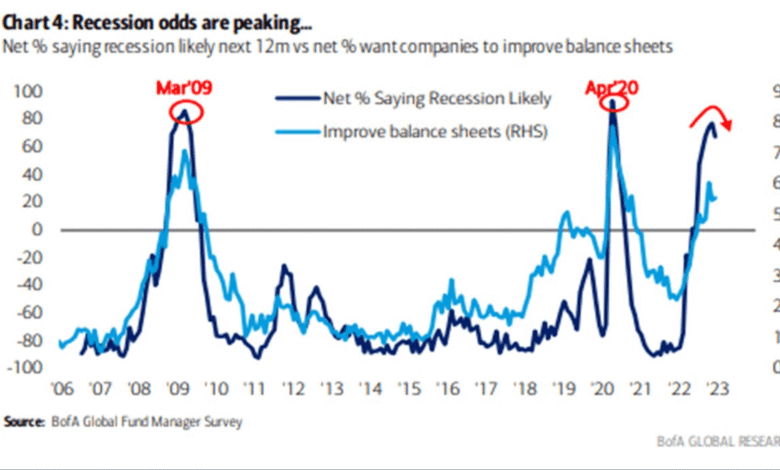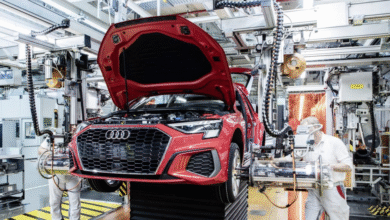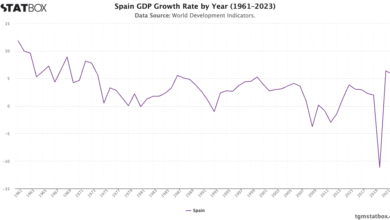CEO Recession Expectations Decline in Latest Survey Findings

Recent CEO recession expectations are showing signs of optimism, as less than 30% of corporate leaders predict a mild or severe downturn in the next six months, according to a new survey. This is a dramatic shift from over 60% who expressed similar fears just a few months earlier, highlighting a growing confidence among executives regarding the US economy. The Chief Executive Group’s latest survey also reveals that the outlook for economic growth predictions has improved, with more than 40% of CEOs now expecting positive developments. As concerns surrounding tariff impacts begin to lessen, the business environment appears to be stabilizing. This downward trend in recession fears indicates a significant change in the CEO outlook, painting a more hopeful picture for economic resilience in the face of potential challenges.
As discussions about potential economic downturns heat up, the latest insights into executive sentiment indicate a notable shift in attitudes. Many top leaders in the corporate world are recalibrating their forecasts and displaying renewed optimism about future economic performance. Recent findings suggest that a strong majority of CEOs now foresee ongoing economic growth, a departure from earlier forecasts that leaned heavily towards the risk of recession. These adjustments in perspective may be influenced by a variety of factors, including evolving trade policies and the decreasing anxieties related to tariff effects. Such a recalibration reflects broader dynamics in the marketplace as executives navigate uncertain economic waters in search of stability.
Decline in CEO Recession Expectations
Recent data from the Chief Executive Group reveals a notable drop in the number of CEOs who predict a recession within the next six months. With only 30% of business leaders now foreseeing either a mild or severe downturn, this marks a sharp reduction from over 60% just a few months ago. The shift in CEO sentiment can largely be attributed to easing trade tensions, particularly following President Trump’s tariff announcements that initially spooked many in corporate America.
The decline in recession expectations is significant when considering the broader economic implications. As CEOs recalibrate their outlooks, we see an emerging optimism about the U.S. economy’s resilience amidst tariff-related concerns. This shift is likely driven by an increase in those anticipating economic growth, which has risen from a mere 23% in April to above 40% in recent weeks. Such optimism among leaders is crucial for bolstering consumer confidence and stimulating economic activities.
Impact of Tariffs on CEO Outlook
The introduction of tariffs by the Trump administration had a profound impact on CEO outlooks earlier this year. Concerns that these trade policies would lead to diminished consumer spending and overall economic slowdown prompted heightened fears of a recession among executives. Many expressed apprehension in earnings calls, highlighting how these measures could signal broader economic disruption.
However, with recent negotiations and a possible easing of tariff pressures, businesses are reassessing their positions. The latest survey indicates that a significant percentage of CEOs now believe that the most severe economic shocks are behind them. This turnaround reflects a trend of increased optimism within corporate circles, as many executives note that the reduction in tariff threats allows for a more stable forecasting environment.
Despite this renewed hope, the long-term effects of tariffs on the economy remain a topic of debate. Executives continue to voice concerns about how tariffs could affect profit margins and consumer pricing strategies. As discussions continue, it’s evident that the impacts of trade policies will shape CEO perceptions of economic stability moving forward.
Economic Growth Predictions Amid Recession Fears
With less than a third of CEOs now expecting a recession, the remaining executives are increasingly optimistic about future economic growth. This contrasts sharply with sentiments expressed just months ago when fears of stagnant growth prevailed. The rise of pro-growth rhetoric among CEOs indicates a potential recovery trajectory for the U.S. economy, suggesting a retreat from the panic that dominated earlier in the year.
This renewed focus on economic growth reflects a broader shift in the narrative surrounding the U.S. economy. The significant increase in CEOs predicting growth, now exceeding 40%, demonstrates a departure from previous months characterized by heightened anxiety due to tariff implementations. As business leaders regain confidence, it’s essential for them to convey this optimism to employees and consumers alike to ensure a robust economic rebound.
Consumer Sentiment and Recession Outlook
Consumer sentiment plays a pivotal role in shaping economic outlook, especially in light of recent tariff discussions. The University of Michigan’s consumer sentiment index indicates a troubling drop, signaling that everyday Americans are growing increasingly apprehensive about their financial futures. This decline reflects a direct correlation with tariff announcements and their perceived threats to household budgets.
However, contrasting findings from a recent New York Federal Reserve survey suggest that as the tariff landscape stabilizes, consumers are easing their inflation concerns. This emerging positivity has the potential to enhance consumer spending, an essential driver for sustained economic growth. It’s imperative for CEOs to understand consumer sentiment dynamics to strategically navigate their businesses through changing economic climates.
Navigating Stagflation Fears
The term ‘stagflation’ has surfaced as a concern among economists and business leaders, referring to a scenario where stagnant growth coexists with high inflation. As the economy adjusts to recent tariff discussions, these fears are becoming focal points in earnings calls and strategic planning sessions. CEOs are acutely aware of the potential impacts of stagnation on consumer spending and are adjusting their forecasts accordingly.
As corporations grapple with these fears, many are seeking innovative strategies to maintain growth while navigating inflationary pressures. Developing pricing strategies that accommodate rising costs without alienating consumers is crucial. Furthermore, smooth communication regarding economic health and tariff implications can help alleviate concerns and aid in stabilizing the market.
Corporate America and Economic Policy Changes
Corporate America is consistently reacting to economic policy shifts, particularly with respect to trade agreements and tariff implementations. The dynamic nature of these policies creates an environment where CEOs must remain agile, adapting their business strategies based on the latest government directives. This adaptability is critical as firms work to protect their interests amid potential economic downturns.
Furthermore, the ongoing negotiations between the U.S. and other countries illustrate the delicate balance between international trade relations and domestic economic stability. CEOs are closely monitoring these developments, recognizing that favorable outcomes could foster a more optimistic economic outlook. Business leaders need to stay engaged in policy discussions to effectively address the volatility that can arise from changes in trade practices.
Understanding CEO Perspectives on Tariff Impacts
The ongoing discourse around tariff impacts offers critical insights into CEO perspectives on economic stability. Many CEOs have indicated that while tariffs may provide short-term benefits for certain sectors, the longer-term ramifications—especially concerning consumer sentiment—could hinder overall economic growth. The nuance in these perspectives is vital as it informs strategic adjustments within companies striving for profitability.
Moreover, the balance between competitive pricing and profitability in the face of tariffs remains a pressing concern. CEOs must weigh the implications of their pricing strategies and consider how tariffs directly influence their supply chains and overall market positioning. Understanding these dynamics is essential for navigating both current economic climates and future prospects.
Future Economic Trends Post-Recession Scare
Looking ahead, the economic landscape appears to be transitioning away from recession fears as CEOs express a more favorable outlook. The proactive steps taken by businesses to mitigate tariff impacts and cultivate consumer confidence are encouraging for future economic trajectories. As more leaders discuss growth opportunities, the potential for innovation and expansion remains promising.
In conclusion, the pivot away from an impending recession reflects a mix of strategic foresight and adaptive leadership within corporate America. By embracing emerging trends and maintaining open dialogues about economic conditions, CEOs can harness the potential for robust growth and navigate the complexities of the global economy. The continued assessments of recession expectations will be pivotal in shaping business strategies for the months to come.
Frequently Asked Questions
What are the current CEO recession expectations based on recent surveys?
According to the latest survey by the Chief Executive Group, less than 30% of CEOs anticipate a mild or severe recession in the next six months. This marks a significant decline from over 60% in April, indicating a shift in CEO outlook regarding the U.S. economy.
How have tariff impacts influenced CEO recession expectations?
Initially, the announcement of tariffs led to heightened recession fears among CEOs, peaking at 62% in April. However, as some tariffs have been put on hold, CEO recession expectations have decreased significantly, suggesting that businesses are adjusting to the evolving economic landscape.
Are CEOs optimistic about economic growth predictions in the U.S.?
Yes, the current CEO outlook reflects increasing optimism, with over 40% of CEOs now predicting economic growth in the U.S., a stark contrast to just 23% in April. This change in sentiment signals a potential recovery from the earlier concerns associated with tariffs.
What role does the recession survey play in understanding CEO perspectives?
The recession survey provides valuable insights into CEO expectations and serves as an indicator of corporate sentiment regarding the U.S. economy. It highlights shifts in economic growth predictions and concerns related to tariffs and potential impacts on consumer behavior.
Have concerns about stagflation impacted CEO recession expectations?
While the specter of stagflation has been discussed, implying concerns over stagnant growth coupled with inflation, CEO recession expectations have decreased overall in recent surveys. This suggests that business leaders are cautiously optimistic despite some lingering worries about economic volatility.
How are consumer behavior and sentiment affecting CEO recession expectations?
Consumer sentiment, as measured by the University of Michigan index, has declined amid tariff announcements, leading to cautious spending. This cautious behavior has contributed to CEO recession expectations, as businesses recognize that consumer psychology can significantly influence economic growth.
What impact have negotiations on tariffs had on CEO recession expectations?
The ongoing negotiations surrounding tariffs have provided a stabilizing effect on CEO recession expectations. As tariffs have been paused and discussions continue, CEOs are more optimistic, reflecting a change in their predictions for economic growth in the U.S.
How does the recent decline in CEO recession expectations compare to past months?
The decline in CEO recession expectations is notable when compared to earlier months; for instance, expectations dropped from 62% in April to less than 30% in the latest survey. This shift suggests a changing outlook among business leaders as they adapt to new information and policy adjustments.
| Key Point | Details |
|---|---|
| Decline in Recession Expectations | Less than 30% of CEOs expect a mild or severe recession in the next six months, down from over 60% in April. |
| Improvement in Growth Outlook | Over 40% of CEOs now expect some level of growth in the U.S. economy, up from 23% in April. |
| Concerns Over Tariffs | The uncertainty regarding Trump’s tariffs had initially caused a spike in recession concerns, but many tariffs have since been put on hold. |
| Consumer Sentiment | The consumer sentiment index is near historic lows, reflecting worries stemming from tariffs, although optimism is increasing as fears of inflation decrease. |
| Corporate Earnings Calls | The term ‘recession’ has been mentioned in 150 earnings calls of S&P 500 companies, double the mentions from the previous year. |
| Overall Corporate Sentiment | Many CEOs believe the worst concerns about recession have passed, with optimism about the economic outlook growing. |
Summary
CEO recession expectations have significantly decreased since April, indicating a shift in corporate sentiment towards a more optimistic economic outlook. As less than 30% of CEOs foresee a recession in the coming months, it reflects a response to eased tariff concerns and a recovering market. This optimistic view suggests that business leaders are beginning to focus more on growth, with over 40% now expecting economic growth, compared to only 23% in April. The overall sentiment in corporate America is changing, indicating that fears of a recession may be subsiding as negotiations around tariffs continue and consumer confidence begins to stabilize.



